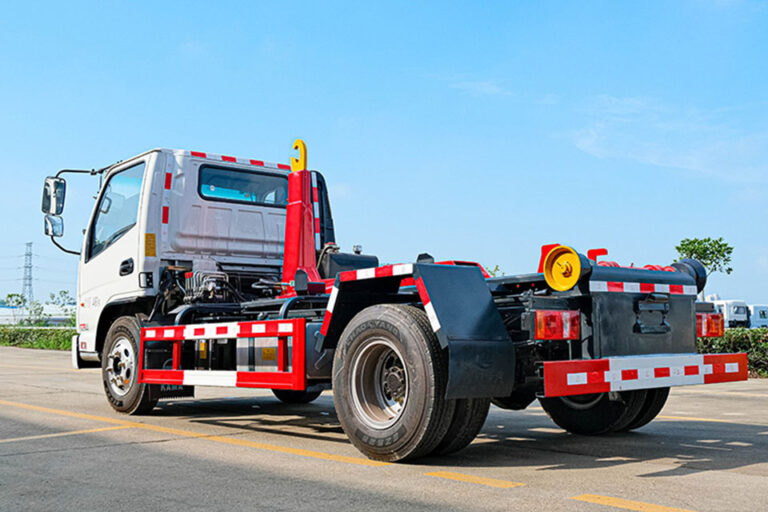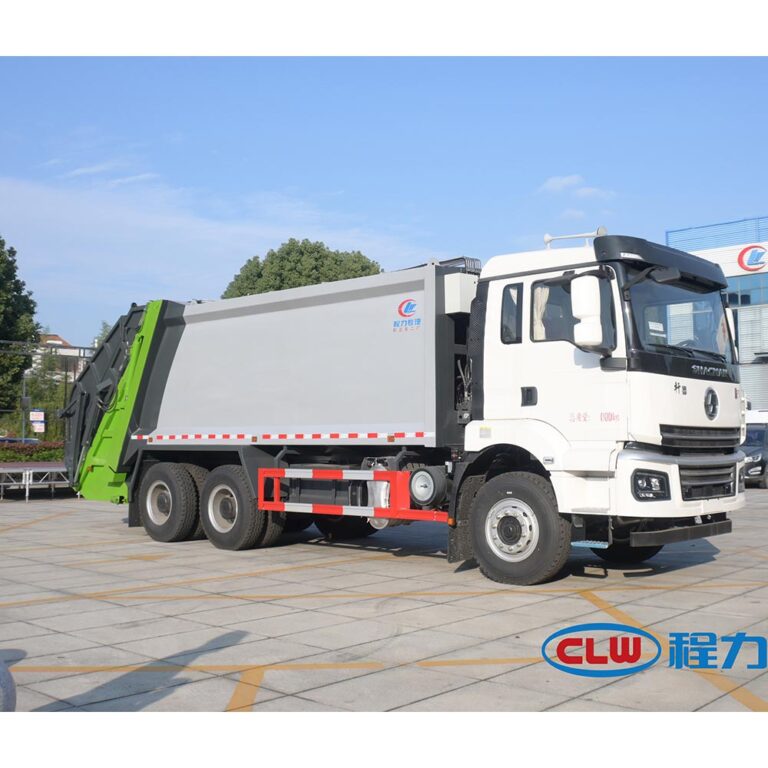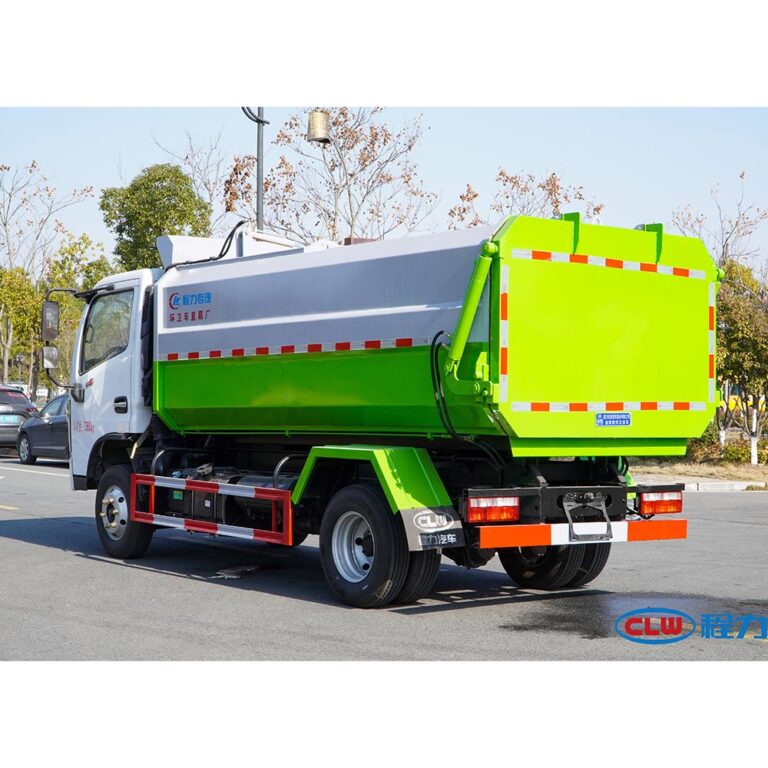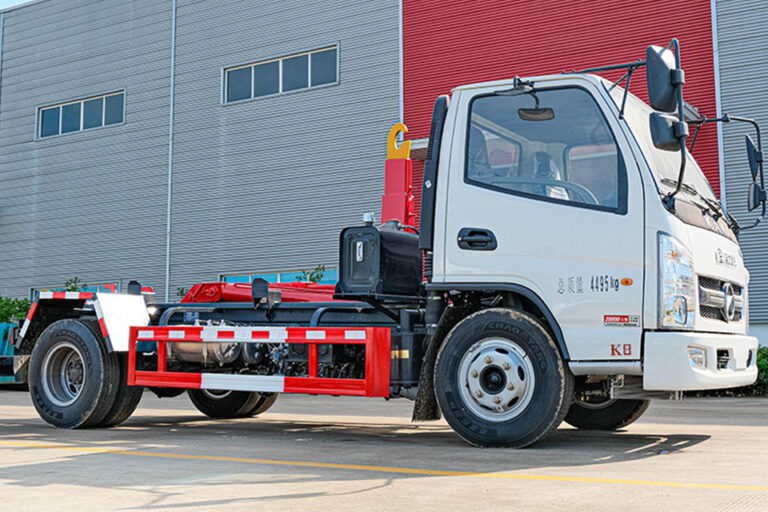
Quelles sont les différentes tailles de camions-citernes ?
Capacité et transport des camions-citernes : Un guide complet
Cet article présente une vue d'ensemble des camions-citernes, de leurs types, de leurs capacités et des règles de sécurité, en mettant l'accent sur leur rôle essentiel dans divers secteurs d'activité. En tant qu'expert dans le domaine de la fabrication de camions-citernes, je souhaite partager mes connaissances et mon expérience pour vous aider à comprendre pourquoi ces véhicules spécialisés sont essentiels pour les distributeurs de fioul, les entreprises de CVC, les compagnies pétrolières et gazières, les agences gouvernementales, les entreprises de construction, les exploitations minières, les entreprises agricoles, les services d'urgence, les chemins de fer et le transport maritime. La lecture de cet article vous apportera des informations précieuses qui vous permettront de prendre des décisions éclairées concernant les solutions de transport et de stockage des carburants et, en fin de compte, d'améliorer l'efficacité et la sécurité de vos opérations.
Table des matières
Quels sont les différents types de camions-citernes ?
Citerne camions sont des véhicules spécialisés conçu pour transporter des liquides ou gaz. Il existe plusieurs types de camions-citernesChacun d'entre eux est conçu pour répondre à des besoins spécifiques. Par exemple, camions-citernes sont couramment utilisés pour fournir du carburant aux stations-service, tandis que pétroliers sont conçus pour le transport de pétrole brut ou de produits raffinés. pétrole produits.
- Camions-citernes ont généralement une capacité du réservoir de 500 à 5 000 gallonsen fonction de leur taille et de leur objectif.
- Pétroliers peut avoir un impact beaucoup plus important sur l'environnement. capacité plus élevéeparfois plus de 10 000 gallons.
Camions-citernes sont également utilisés pour transporter toute une série d'autres liquides et les gaz, y compris les gaz industriels Produits chimiques, gaz de pétrole liquéfié (GPL ou propane), et même des produits de qualité alimentaire. Chaque type de camion-citerne est spécialement conçu pour le transport son cargaison de manière sûre et efficace. Par exemple, un Camion de transport d'huile alimentaire est conçu pour transporter des liquides de qualité alimentaire. Ces derniers les camions arrivent en différentes tailleset leur taille des réservoirs varient en fonction de l'utilisation prévue. Par exemple, un gaz Le camion-citerne est très différent du camions-citernes.
Comment la sécurité du transport des carburants est-elle réglementée ?
Sécurité du transport des carburants est une préoccupation majeure, compte tenu de la nature dangereuse de la cargaison. Règles de sécurité régissent la conception, la construction et l'exploitation des camions de livraison de carburant pour minimiser les risques. Ces règlements couvrent des aspects tels que réservoir la construction, les systèmes de ventilation, les vannes d'arrêt d'urgence et la formation des conducteurs.
- Camions utilisé pour transporter l'essence ou diesel doivent répondre à des exigences strictes en matière de normes de sécurité pour éviter les fuites et les déversements.
- Règles de sécurité dicte également la capacité maximale et poids brut de camions-citernes pour garantir la stabilité et éviter les accidents.
Il est essentiel que les opérateurs respectent ces réglementations afin de maintenir la sécurité et la conformité. Des inspections et une maintenance régulières sont essentielles pour garantir que camions-citernes sont dans un état optimal. En tant que fabricant, nous donnons la priorité à la sécurité dans nos conceptions, en veillant à ce que nos camions respectent ou dépassent toutes les normes applicables règles de sécurité.

Qu'est-ce qui détermine la capacité d'un camion-citerne ?
Les capacité d'un camion-citerne à carburant est déterminé par plusieurs facteurs, notamment sa taille, sa conception et le type de liquide il est conçu pour transporter. Camions-citernes ont généralement une capacité en volume de 500 à 5 000 gallons, tandis que les plus grandes camions-citernes peut transporter jusqu'à 11 600 gallons. Par exemple, le Camion de ravitaillement en acier au carbone de grande capacité est conçu pour des besoins en carburant plus importants.
- Les taille et volume de la réservoir de stockage sont les principaux déterminants de la capacité.
- Conceptions de camions-citernes influencent également capacitécar certains sont construits avec plusieurs compartiments à transport différent grades de carburant ou gaz.
- La densité de la liquide transportée affecte également capacité. Par exemple, un camion transportant l'essence aura un capacité qu'un seul porteur diesel en raison de la différence de densité.
La compréhension de ces facteurs permet de sélectionner la bonne camion-citerne pour vos besoins spécifiques. Nous proposons une gamme de camions avec des capacités variables pour répondre à des besoins différents.
Pourquoi les camions de livraison de carburant sont-ils essentiels pour diverses industries ?
Camions de livraison de carburant sont essentiels pour assurer un approvisionnement régulier en carburant à diverses industries. Ils fournissent carburant aux stations-service, aux aéroports, aux sites industriels et à d'autres endroits où le carburant est nécessaire. Pour des secteurs tels que la construction, l'exploitation minière et l'agriculture, il est essentiel de disposer d'un approvisionnement fiable en carburant.
- Camions-citernes veiller à ce que les entreprises disposent du carburant nécessaire pour alimenter leurs machines et équipements.
- Dans les endroits éloignés, camions de livraison de carburant sont souvent le seul moyen d'obtenir du carburant.
D'après mon expérience, carburant livraison camions jouent un rôle essentiel dans le bon déroulement des opérations. Les ruptures d'approvisionnement en carburant peuvent entraîner des temps d'arrêt et des retards coûteux. C'est pourquoi il est important de disposer d'un carburant Le système de livraison est essentiel pour de nombreuses entreprises. Un autre type spécialisé est le Citerne pétrolière en alliage d'aluminium - 320HP, 26m³ de capacitéIdéal pour le transport de charges lourdes.
Quels sont les trois modèles de base des camions-citernes ?
Camions-citernes entrer trois éléments de base modèles : à compartiment unique, à compartiments multiples et sur remorque. Chaque modèle offre des avantages uniques en fonction de l'application.
- Pétroliers à compartiment unique sont le type le plus simple et le plus courant. Ils ont un grand réservoir de stockage et sont généralement utilisé pour transporter un seul type de liquide.
- Citerne à compartiments multiples ont plusieurs compartiments au sein de la réservoir, ce qui leur permet de transport différent types de liquides ou les qualités de carburant simultanément. Ils sont utiles pour délivrer diverses produits en même temps.
- Citerne sur remorque consistent en une réservoir qui est monté sur un remorque. Cette conception offre une plus grande flexibilité, car le remorque peut être détaché de la camion lorsqu'il n'est pas utilisé.
Le choix de la bonne conception dépend de vos besoins opérationnels. Nous proposons camions-citernes dans les trois modèles, offrant ainsi des options pour diverses applications.
Quel est l'impact de la taille et du volume des camions-citernes sur les opérations ?
Les taille et volume de camions-citernes Les grandes entreprises ont un impact significatif sur leurs capacités opérationnelles. Plus grand camions peut transporter plus liquidece qui les rend aptes à effectuer des livraisons en grande quantité. Cependant, ils peuvent être moins maniables dans les espaces restreints.
- Plus petit camions-citernes sont plus polyvalents et peuvent accéder à des endroits où l'espace est limité.
- Le choix entre une grande ou une petite camion-citerne dépend des exigences spécifiques de l'emploi.
Camions-citernes sont conçu pour transporter des liquides et gaz efficacement. Leur taille et volume déterminer le montant qu'ils peuvent transporter et où ils peuvent opérer. Nous proposons une variété de camion-citerne pour répondre à différents besoins opérationnels, ce qui vous permet de disposer de la bonne solution. camion pour le poste. Considérez un Camion de ravitaillement Furika 8.5m³ réservoir de carburant, moteur 170HP pour des opérations plus petites et plus souples.
Quels sont les matériaux utilisés dans la construction des camions-citernes ?
Camions-citernes sont typiquement fait de divers matériauxLe choix du matériau dépend du type de bâtiment. Le choix du matériau dépend du type de liquide transporté et la durabilité et le poids souhaités de l'emballage. camion.
- Acier au carbone est un choix populaire en raison de sa solidité et de son prix abordable. L'acier pétroliers sont adaptés au transport d'une large gamme de liquides, y compris carburant et produits chimiques industriels.
- Aluminium pétroliers sont plus légers que l'acier, ce qui permet d'améliorer le rendement énergétique. Ils sont souvent utilisés pour transporter l'essence et d'autres lumières liquides.
- Fibre de verre pétroliers sont résistants à la corrosion et conviennent parfaitement au transport de produits corrosifs. liquides.
En tant que fabricant, nous utilisons des matériaux de haute qualité pour garantir la durabilité et la sécurité de nos produits. camions-citernes. Notre camions sont conçus pour résister aux rigueurs d'une utilisation quotidienne et fournir un service fiable.
Quel est le rôle des camions-citernes dans les services d'urgence ?
Camions-citernes jouent un rôle crucial dans les services d'urgence, en particulier dans la lutte contre les incendies et les interventions en cas de catastrophe. Camions-citernes sont utilisés pour transporter de grandes quantités d'eau dans des zones où il n'y a pas d'approvisionnement en eau facilement disponible.
- Dans la lutte contre les incendies, camions-citernes fournissent une source d'eau mobile, permettant aux pompiers de lutter contre les incendies dans des endroits éloignés.
- Lors de catastrophes naturelles, camions-citernes peut être utilisé pour fournir de l'eau potable aux zones touchées.
Les Camion-citerne de sable de fracturation d'une capacité de 31 000 KG est également un véhicule spécialisé utilisé dans les services d'urgence et les services industriels. Nos camions-citernes sont conçus pour répondre aux besoins exigeants des services d'urgence, en fournissant des performances fiables lorsque c'est le plus important.
Comment les camions-citernes sont-ils utilisés dans l'industrie minière et la construction ?
Dans l'industrie minière et la construction, camions-citernes sont utilisés pour transporter carburantl'eau, et d'autres liquides essentiels pour les opérations. Camions-citernes livrer diesel et l'essence pour alimenter les machines et les équipements, tandis que camions-citernes sont utilisés pour la suppression des poussières et d'autres applications.
- Dans les mines, camions-citernes assurer un approvisionnement continu en carburant et l'eau, qui sont essentiels pour les opérations.
- En construction, camions-citernes faire fonctionner les machines, tandis que camions-citernes aident à contrôler la poussière et à fournir de l'eau pour le mélange du béton.
Notre camions-citernes sont conçues pour résister aux conditions difficiles des sites d'exploitation minière et de construction. Elles sont conçues pour durer et être fiables, afin de garantir le bon déroulement de vos opérations.
Quelles sont les innovations qui façonnent l'avenir des camions-citernes ?
Les camion-citerne est en constante évolution, avec des innovations visant à améliorer la sécurité, l'efficacité et la performance environnementale. Parmi les principales innovations, on peut citer
- Matériaux avancés: L'utilisation de matériaux légers mais résistants, tels que la fibre de carbone, pour réduire le poids et améliorer le rendement énergétique.
- Technologie intelligente: Intégration du suivi GPS, de la surveillance à distance et d'autres technologies intelligentes pour améliorer l'efficacité et la sécurité des opérations.
- Combustibles alternatifs: Développement des camions-citernes qui peuvent fonctionner avec des carburants alternatifs, tels que le gaz naturel comprimé. gaz (GNC) ou de l'électricité, afin de réduire les émissions.
Ces innovations sont à l'origine de l'avenir des camions-citernesNous nous efforçons d'améliorer la qualité de nos produits, de les rendre plus sûrs, plus efficaces et plus respectueux de l'environnement. En tant que fabricant avant-gardiste, nous nous engageons à incorporer les technologies les plus récentes dans nos produits. camionsNos clients bénéficient ainsi des solutions les plus avancées qui soient.
FAQ
Quelle est la capacité typique d'un camion-citerne ?
Le cas typique capacité d'un camion-citerne à carburant se situe entre 500 et 5 000 gallonsen fonction de sa taille et de sa conception. Plus grand camions-citernes peut transporter jusqu'à 11 600 gallons.
Comment les règles de sécurité sont-elles appliquées au transport des carburants ?
Règles de sécurité pour transport de carburant sont appliquées par le biais d'inspections régulières, de la formation des conducteurs et du respect des normes de conception et de construction. Les organismes de réglementation effectuent des audits et des inspections pour garantir la conformité.
Quels sont les avantages de l'utilisation d'un camion-citerne à compartiments multiples ?
Camions-citernes à compartiments multiples permettent le transport de différents grades de carburant ou différents liquides simultanément, ce qui permet d'assurer la flexibilité et l'efficacité des livraisons.
Les camions-citernes peuvent-ils être utilisés pour le transport de l'eau potable ?
Oui, camions-citernes peuvent être utilisés pour transporter de l'eau potable, en particulier dans les situations d'urgence ou dans les zones où l'accès à l'eau potable est limité. Ces camions doivent répondre à des normes d'hygiène spécifiques.
Quels sont les meilleurs matériaux pour la construction de camions-citernes destinés au transport de produits chimiques ?
Pour le transport de produits chimiques, des matériaux tels que l'acier inoxydable et la fibre de verre sont privilégiés en raison de leur résistance à la corrosion et aux produits chimiques agressifs.
Comment la taille d'un camion-citerne affecte-t-elle sa maniabilité ?
Les taille d'un camion-citerne affecte directement sa manœuvrabilité. Plus petit camions sont plus agiles et peuvent se faufiler dans des espaces restreints, tandis que les plus grandes camions offrir capacité plus élevée mais peut avoir des limites dans les zones confinées.
Conclusion
En résumé, camions-citernes sont des véhicules indispensables pour diverses industries, fournissant des solutions de transport essentielles pour liquides et des gaz. En voici les principaux enseignements :
- Camions-citernes Il en existe différents types, chacun étant conçu pour des applications spécifiques, telles que distribution de carburantLe transport des produits chimiques et l'approvisionnement en eau.
- Sécurité du transport des carburants est régi par des réglementations strictes qui couvrent la conception, la construction et l'exploitation.
- Les capacité d'un camion-citerne à carburant dépend de sa taille, de sa conception et de la densité de la population. liquide transportés.
- Camions de livraison de carburant sont essentiels au maintien des opérations dans des secteurs tels que la construction, l'exploitation minière et l'agriculture.
- Camions-citernes jouent un rôle essentiel dans les services d'urgence, en fournissant des sources d'eau mobiles pour la lutte contre les incendies et les secours en cas de catastrophe.
- Des innovations telles que les matériaux avancés, les technologies intelligentes et les carburants alternatifs façonnent l'avenir de l'industrie automobile. camions-citernes.
En comprenant ces aspects, vous pourrez prendre des décisions éclairées lors de la sélection et de l'utilisation des produits suivants camions-citernesLes systèmes de gestion de l'eau et de l'assainissement sont des éléments essentiels pour garantir la sécurité, l'efficacité et la conformité de vos opérations. Contactez-nous dès aujourd'hui pour en savoir plus sur notre gamme de produits de haute qualité. camions-citernes conçus pour répondre à vos besoins spécifiques. Nous sommes là pour vous aider à améliorer vos capacités opérationnelles et à atteindre vos objectifs commerciaux.





